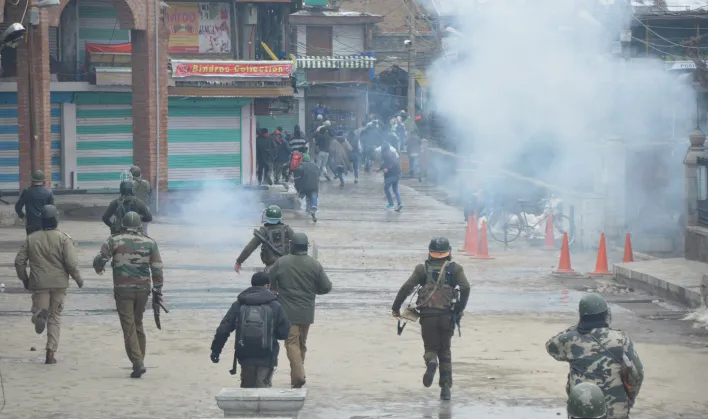Zainab Imran
Kashmir has been facing significant unrest and its people are experiencing hardships. There have been concerns about human rights in the region, especially after the revocation of Article 370 and 35 A. Some argue that the situation in the territory is more than just human rights violations; they see it as a pressing issue that requires global attention. It is a high time to acknowledge that what’s happening in the state is, in fact, a systematic genocide.
The inhuman acts in Indian illegally occupied Jammu and Kashmir (IIOJK) are seen as a part of a larger plan for genocide. The presence of 70,000 Indian soldiers against seven million Kashmiris intentionally targets Muslims and uses pellet guns to suppress their voices. According to the available accounts for 2023, 8000 forced disappearances, 8652 unmarked graves, 7150 extra judicial killings, and molestation of children and women have exposed India’s ‘secular’ façade.
The heinous war crimes of Indian military extend beyond torture to mental anguish. The violence and threats of physical harm had a profound impact on their psychological well-being. According to Medicines Sans Frontiers, an international independent humanitarian organisation, nearly one in ten people (9.4%) has lost one or more members of their family in the freedom struggle. These family losses have severely affected Kashmiri physical and mental health. Moreover, a survey conducted by the same organisation reveals that nearly 1.8 million adults (45% of the population) in Kashmir exhibit symptoms of significant mental distress. This is compounded by the stigma associated with mental illness.
Even during COVID-19 pandemic, the Indian military didn’t cease its violence. Doctors were harassed on their ways to Kashmir and there was an acute lack of medical resources and staff. Internet access was cut off by the authorities, preventing the dissemination of international recommendations for COVID-19 pandemic. Despite the population of seven million, only six ventilators were available in the region. The harsh conditions were intentionally imposed on Kashmiris, putting their lives at risk. The Indian regime has also permitted non-state settlers to purchase properties and secure government jobs in Kashmir. Over six million domicile certificates of the state have been provided to Hindus for demographic altercations. Cross cultural marriages for demographic changes are also being encouraged. This reveals India’s desire to assimilate Kashmir into its territory. Surprisingly, according to India’s latest National family health survey (NFHS-5) conducted under Indian Health Ministry, the fertility rate among Muslim women in IIOJK has sharply declined to 1.4, far below the replacement level of 2.1.
India is systematically disempowering and displacing Kashmiris through an anti encroachment policy proposed by the Indian Home Ministry. As of 2023, India initiated an anti-encroachment drive in 20 districts of IIOJK following an Israeli model of systematic settler colonialism. These processes are intended to dislodge civil population from their properties, leading to their geographical displacement in other parts of India. Given these dynamics, BJP’s design to bring demographic altercations to IIOJK is evident. These alterations would ultimately transform a muslim majority area into a minority. Therefore, if a plebiscite is held in Kashmir, it would likely favour India. However, Kashmiris consistently reject these notions, appealing to the international community to take notice of these genocidal attempts.
To enhance Kashmir’s capacity to protect the civilians from mass atrocities, a global center known as “R2P- Right to Protect was established in 1948. Its aim is to protect citizens of a country from crimes against humanity such as genocide, ethnic cleansing and other war crimes. It consists of three pillars. The third pillar argues that if a state is found complicit in mass atrocities against its people, the responsibility falls on the international community to protect the population with a timely and decisive response. In the case of Kashmir, it’s clear that the UN’s proposed Responsibility to Protect (R2P) theory has not proven effective in de-escalating the situation. Nevertheless, Kashmiris maintain their hope and continue to seek international intervention. Ongoing proceedings in India’s highest court regarding IIOJK’s special status also raise the hopes of oppressed Kashmiris, although the final decision is still pending. The future remains uncertain for Kashmiris.










